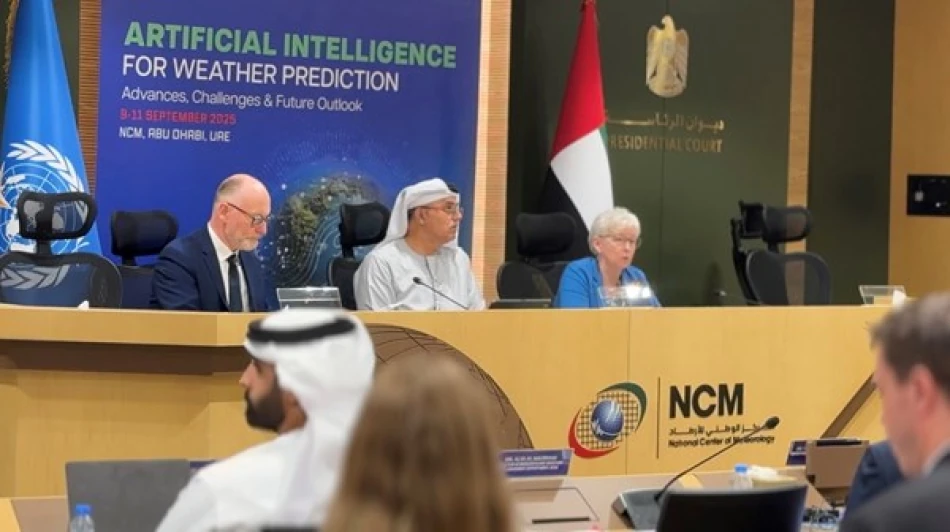
Abu Dhabi Hosts Successful Weather Forecasting Conference
AI Revolution in Weather Forecasting: Global Meteorologists Chart Course for Life-Saving Technology
The global meteorological community has reached a consensus that artificial intelligence will fundamentally transform weather prediction, with the potential to democratize advanced forecasting capabilities and save lives worldwide. A landmark conference in Abu Dhabi concluded with meteorologists, researchers, and industry leaders committing to collaborative AI development that prioritizes equity, transparency, and public trust over commercial competition.
The Convergence Moment for AI and Weather Science
The three-day World Meteorological Organization (WMO) conference, hosted by the UAE's National Center of Meteorology from September 9-11, 2025, marked a pivotal moment in meteorological history. The gathering brought together experts from national weather agencies, research institutions, and private companies to address a critical challenge: how to harness AI's revolutionary potential while ensuring its benefits reach underserved populations currently lacking early warning systems.
This timing is no coincidence. Recent advances in machine learning models have demonstrated unprecedented accuracy in weather prediction, often outperforming traditional physics-based models. Companies like Google DeepMind and tech giants are racing to develop AI weather systems, while national meteorological services face pressure to modernize or risk obsolescence.
Building Trust in an AI-Driven Future
The Authority Challenge
Conference participants emphasized that trust—not technical capability—will determine AI weather forecasting's success. National meteorological services maintain exclusive authority for issuing official weather warnings, a responsibility that becomes more complex as AI tools proliferate. The challenge lies in maintaining public confidence in official sources while embracing innovative technologies that may originate from private sector competitors.
This concern reflects broader tensions in the weather industry. Private companies like IBM's Weather Company and emerging AI startups are developing sophisticated forecasting tools, potentially challenging the traditional role of government meteorological agencies. The conference's emphasis on maintaining official authority suggests recognition that fragmented weather information could undermine public safety during extreme events.
Transparency as a Competitive Advantage
Participants stressed that AI weather systems must be auditable, adaptable, and sustainable—qualities that distinguish reliable public services from commercial products. This approach mirrors successful AI governance frameworks in healthcare and finance, where transparency requirements have fostered innovation while protecting public interests.
Data Democracy and Global Equity
Breaking Down Digital Barriers
The conference identified data sharing as the critical bottleneck for AI weather advancement. Unlike traditional forecasting, which relies primarily on standardized global observations, AI systems require vast datasets that may include satellite imagery, radar data, and real-time sensor networks. The current system, where wealthy nations possess superior data infrastructure, could exacerbate global forecasting inequalities.
Conference participants advocated for open data initiatives that would level the playing field. This approach contrasts with the tech industry's typical data hoarding strategies, suggesting that meteorological applications may pioneer new models of collaborative AI development.
Regional Implementation Strategy
The emphasis on regional deployment reflects practical realities in global weather forecasting. While AI models can process global data, effective implementation requires local expertise, cultural adaptation, and infrastructure development. This approach echoes successful technology transfer programs in renewable energy and telecommunications, where regional hubs have accelerated adoption in developing markets.
Market Implications and Investment Opportunities
The conference's conclusions signal significant opportunities for investors and technology companies willing to prioritize collaboration over competition. The meteorological community's commitment to open standards and shared infrastructure could create new markets for specialized AI tools, training programs, and data management systems.
Unlike consumer AI applications that benefit from network effects and data monopolies, weather forecasting AI appears headed toward a more collaborative model. Companies that align with these principles—emphasizing interoperability, transparency, and global access—may find themselves preferred partners for national meteorological services and international organizations.
Looking Ahead: A New Paradigm for Scientific AI
The Abu Dhabi conference may have established a template for responsible AI development in critical public services. By prioritizing equity, transparency, and collaboration over speed and market dominance, the meteorological community is charting a different course than other AI applications.
The proposed framework—emphasizing openness, reproducibility, and ethical innovation—could influence AI governance beyond weather forecasting. As governments worldwide grapple with AI regulation, the meteorological community's approach offers a practical model for balancing innovation with public interest.
The success of this collaborative approach will likely depend on sustained funding for international cooperation and the willingness of private companies to participate in open development models. If successful, it could demonstrate that the most transformative AI applications may emerge not from competitive races, but from collaborative efforts to solve humanity's shared challenges.
Most Viewed News

 Layla Al Mansoori
Layla Al Mansoori






